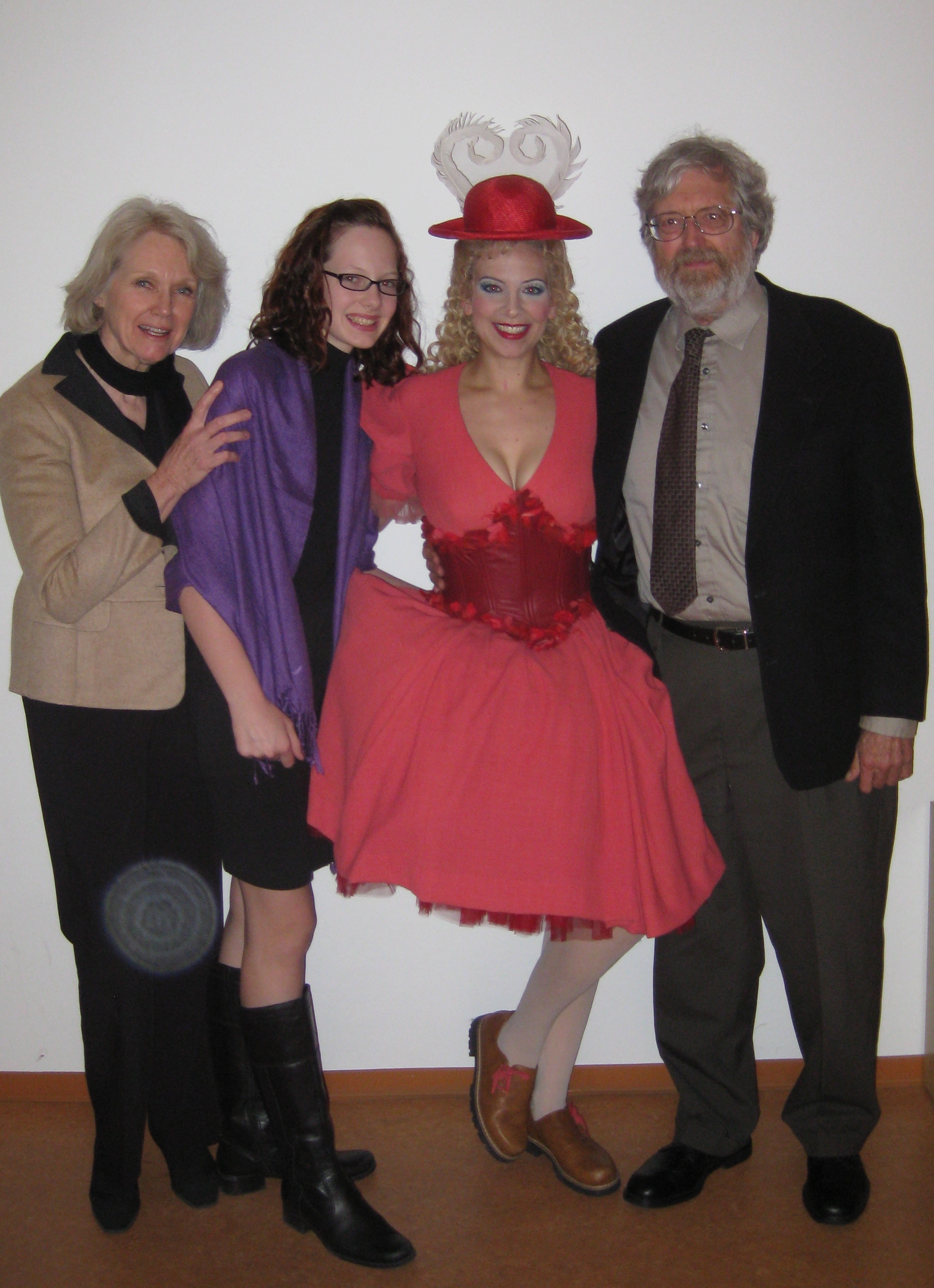When Jennifer Porto ('00 music) moved to Germany more than 11 years ago, she only packed two suitcases. But she made room for one item from Ames: a painting of Iowa State University's Music Hall.
"It's such a beautiful memory of four fundamental years of my life," she said.
Now a professional opera singer with an established international career in Berlin, it would be understandable if Porto had left those Iowa State days behind. Yet she can still recite the names of seemingly every Music and Theatre faculty and staff member from her student days, from the friendly folks in the front office to the teachers of instruments she herself did not even play.
Porto's LAS degree gave her the foundation for a career that hits all the right notes: one with a passion for performance and a love of learning.

Renaissance woman
Porto, a native of Des Moines, Iowa, did not set out to be an opera singer.
Her majors of choice when considering college? Biochemistry or Spanish.
"I was conflicted about studying music and I had zero interest in becoming a music teacher. A lot of music people I knew were not interested in things that were not music, and I didn't want to lose my curiosity about science and math."
A high school choir teacher encouraged Porto to take voice lessons and when she later auditioned at Iowa State, she discovered the music faculty did not mind if she was new to modes or perfect fifths.
"I love that Iowa State accepted me, and they saw potential in me. It was, 'Okay, she didn't learn this already? We can teach it to her.'"
And they did.
Instructors like Carl Bleyle, professor emeritus of music history, introduced Porto to music through a liberal arts lens.
"I can't stress what an important figure Dr. Bleyle was in my musical development," she said. “He was so fundamental in my development as a singer, a performer, a scholar and a lifelong learner. He was like my musical father, and I was like his musical daughter."
"I can't stress what an important figure Dr. Bleyle was in my musical development. He was so fundamental in my development as a singer, a performer, a scholar and a lifelong learner. He was like my musical father, and I was like his musical daughter."
Porto had her first taste of European opera as a sophomore when Bleyle and his wife Patricia took a group of Iowa State students on a study abroad trip to Florence, Italy. Surrounded by Renaissance art, culture, history and music, Porto's boundless curiosity was constantly on display.
"Many music majors did not care for a liberal arts approach to music history," Bleyle said. "They wanted to pass their test, and move on. Jennifer was interested in all the other aspects that surrounded music."

Delving deeper
After graduating from Iowa State, Porto earned a master's degree at the Cleveland Institute of Music, a premier conservatory for classical musicians. Still wavering on whether a music performance career was right for her, she received a Fulbright to dig through libraries in Leipzig, Germany, searching for lost compositions that never made their way out of the former East Germany.
In finding lost music, she found a new side of herself.
"I did American premieres of songs and Berlin premieres of songs and was able to satisfy the person in me that needed to be a performer on stage and the part of me that needs to delve deeper into learning what's behind the music."
"I did American premieres of songs and Berlin premieres of songs and was able to satisfy the person in me that needed to be a performer on stage and the part of me that needs to delve deeper into learning what's behind the music."
It only took her ten years from seeing her first opera as an Iowa State sophomore to landing a soloist contract with Opera Leipzig on one of Germany's biggest stages. The Bleyles, then still running the Florence program, traveled to Leipzig one weekend, sat in row eight of the theatre and watched their former student perform the role of Papagena in Mozart's "The Magic Flute."

The feat of being 'fest'
Performing as "fest" in Germany, meaning a fixed soloist with the opera company, is intense. Porto, a soprano, performed evenings, weekends, and holidays in 10 to 11 productions per season, sometimes rehearsing three shows at a time. One of her favorite roles was playing Jenny Smith, the female lead in the "Rise and Fall of the City of Mahagonny."
"It is a crazy piece of music," Porto said. "Jenny is a prostitute who abandons the man she says she loves because he doesn't have money anymore. You have to make her likable. There has to be something compelling about her. She's scared and she's desperate, so I have to find something in my life or experience when I was scared and desperate and build it from there."
Opera companies hire people based on the Fach system, which fits Porto's versatile talents perfectly, Donald Simonson, Morrill professor of music and theatre and voice division chair, explained.
"In the Fach system, if you can sing one role, they make the assumption that you can cover any of the other roles that fit those characteristics," he said. "Then they can do any opera because they can cover any of those roles. Jen can do so many things that she is invaluable. When she sings it's also gorgeous, but that flexibility and quick study and intelligence and broad-based foundation of knowledge about so many things helps her in everything she does."
"Jen can do so many things that she is invaluable. When she sings it's also gorgeous, but that flexibility and quick study and intelligence and broad-based foundation of knowledge about so many things helps her in everything she does."

Simonson, who was Porto's voice teacher at Iowa State, recalled one of her early ISU Theatre performances in a show called "Shakespeare's Women."
"The director of that show was a theatre faculty member named Gregg Henry, and he came into my office after casting the show and a week of rehearsals," Simonson remembered. "He said, 'Jennifer will do anything. She will throw herself across the stage as many times as we need to do it, not caring a thing. She is going to make it. She will make it because she will try everything and keep doing it until she succeeds.' And I remember seeing her in that show and not recognizing the person because she played the role with abandon. That is how she approaches just about everything in music and life."
It takes that kind of dedication in a field so elite that for every job there are hundreds of applicants, Simonson said.
"Boy, were we lucky when we opened the door and she stepped in."
Going solo
Porto performed with Opera Leipzig for seven years. Now she has a new role balancing motherhood and freelance work, stretching herself in the process.
"A few years ago, Opera Leipzig wanted to bring in different audiences and show their soloists from a different side," she said. "I've always been someone who will try something new."
So she took her classically trained voice and set it loose singing pop music.
"Secretly, if I could have been a pop star I would have desperately," she joked. "I love popular music so much. When I'm listening to stuff at home, most of the time I'm listening to pop music."
She created a solo show around popular songs from the 1920s, 30s, 40s and 50s, made famous by women like Marilyn Monroe and Marlene Dietrich.
"They were these amazing little gems, and I loved the idea of singing these songs that everyone knows and restructuring a story around them," she said. "I realized as a performer I have more fun when I can speak and communicate directly with the audience and draw people in."

After two successful solo shows, "Good Girls/Bad Girls" and "Lerne Lieben," she is now researching a new show about Renate Müller, a German actress who refused to star in Nazi propaganda films in the 1930s and later died a mysterious death.
"It's my first try at making a piece based on a real person using elements from her real life and delving into what makes her story," Porto said. "In Germany, it's difficult and risky to perform certain things still. I'm excited about the social and political implications of these songs. It's exciting to think about them in terms of history and how these things speak to us and how those circumstances speak to us today."
'I'm a girl from Iowa'
Two years ago, Porto returned to Ames for a surprise performance. It was Bleyle’s 50th anniversary of serving as choir director and organist at Collegiate United Methodist Church in Ames, Iowa.
“Who pops up at that celebration but Jennifer Porto from Leipzig?” Bleyle said. “She flew all the way from Germany. We had no idea. I looked up all of the sudden and there she was in the choir.”
It was a long way to travel to sing a song. But Porto is used to going places.
"Here I am in Berlin. Most of the singers over here working internationally know each other because they went to Indiana or Michigan or Juilliard or Manhattan. I'm a girl from Iowa, and I can't believe I made it this far. Every once in awhile I think, 'How did this ever happen?'”
The answer is simple.
"An LAS degree was really, really good to me, and I'm so happy I went to Iowa State."
